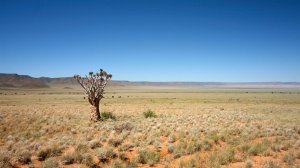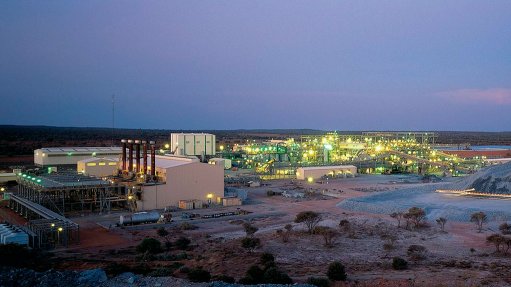SA set to allow shale gas exploration to proceed despite 24-month risk assessment
The South African government has formally launched a R12.5-million, 24-month strategic environmental assessment (SEA) of shale gas mining in the Karoo in an effort to understand the potential environmental risks of exploiting probable, but as yet unexplored, unconventional gas resources in the water-stressed territory. However, it has also indicated that it plans to allow energy companies to conduct parallel exploration activities, with the Department of Mineral Resources set to seek Cabinet approval imminently for supportive regulations.
The Departments of Environmental Affairs, Science and Technology, Energy, Water Affairs and Sanitation and Mineral Resources (DMR) announced the SEA jointly on Tuesday, with Science and Technology Minister Naledi Pandor reporting that the assessment would also need to establish whether shale gas mining posed possible risks to the Square Kilometre Array project.
The scope of the SEA would also cover biodiversity and ecosystem services; water resources, including surface and groundwater; geophysics; economics, including the impact on agriculture and tourism; spatial planning; national energy planning; waste management; human health impacts; air quality; the impact on the social fabric; visual and noise impacts; heritage resources and the possible impact on the area’s ‘sense of place’.
The SEA project team will be led by internationally rated scientist Professor Bob Scholes, a Council for Scientific and Industrial Research (CSIR) research associate from the University of the Witwatersrand. A project executive committee would be responsible for coordinating a multi-author drafting process, while a multistakeholder process custodian group would be established to oversee the governance of the process.
Scholes stressed that opponents and proponents of hydraulic fracturing, or fracking, would be included in the custodian group, who would not determine what was written but would ensure the drafting process was “salient, legitimate and credible”.
Treasure Karoo Action Group (TKAG) CEO Jonathan Deal said he was "most encouraged" by the development, arguing that the SEA was a fundamental step in the appropriate evaluation of shale gas in South Africa and was the kind of process that the TKAG had been seeking ever since 2011.
"TKAG will be involved in the process and it intends to use every opportunity to play a pivotal role – from defining terms of reference, to placing specific data in front of the assessors in an effort to ensure that government policy is informed by science," Deal added.
The SEA, Deal added, should “inject a crucial scientific dimension to the decision-making process and play a significant role in driving the outcome of policy, legislation, regulations and indeed the final decision in connection with fracking”.
It was anticipated that as many 50 expert authors would be involved in the project, with a further 28 international reviewers likely to be drawn in. However, Scholes stressed that members of the public could also contribute; a process that would be facilitated through a dedicated website, which could be found a www.seasgd.csir.co.za.
But Mineral Resources Deputy Minister Godfrey Oliphant stressed that government also wanted the much-delayed exploration of the Karoo to proceed and indicated that the regulations, which had been “broadly consulted”, should be approved by Cabinet during June.
He even indicated that, once approved, the DMR might consider entertaining new applications over-and-above those that had already been received prior to February 1, 2011, from Shell South Africa Upstream, Falcon Oil and Gas, and Bundu Oil and Gas Exploration.
Oliphant refused to be drawn on the nature of the regulations and whether exploratory fracking would be allowed during the exploration phase. But he stressed that the potential for large-scale shale gas resources offered exciting economic and energy prospects for South Africa.
Energy Deputy Minister Thembisile Majola echoed these sentiments, arguing that the discovery of shale gas could change South Africa’s energy landscape and create the basis for an entirely new industry.
Current estimates suggest that the Karoo basin could hold between 380-trillion cubic feet (tcf) and 485 tcf, but the actual size of the resource could only be determined by active exploration.
Environmental Affairs Minister Edna Molewa stressed that the precautionary principle would apply until South Africa had a better handle on the potential risks. However, she also indicated that safeguards were already in placed through South Africa’s existing environmental legislation to facilitate exploration while the SEA process continued.
That said, the SEA outcomes would influence the future regulatory regime and Scholes said energy companies would need to determine whether or not it was worth the risk of proceeding with exploration. It has been estimated that each exploration well could involve an investment of between $150-million and $200-million.
Scholes acknowledged that it would have been preferable to complete the SEA process ahead of exploration, but that the process would be managed in such a way that the potential environmental risks were mitigated.
“In an ideal world, one would do all of these things perfectly sequentially, but that is not the world that we live in,” Scholes mused, describing it as a “real chicken-and-egg problem”.
“The process that has unfolded is that a set of environmental protections has been put in place – through a quite participatory and open process – to allow the exploration phase to begin, before the full assessment is completed. [But] the major potential impacts . . . are really during the exploitation phase, rather than the exploration phase,” he said, indicating that it would still be some time before energy companies would be in a position to make investment decisions that could lead to shale-gas production.
Comments
Press Office
Announcements
What's On
Subscribe to improve your user experience...
Option 1 (equivalent of R125 a month):
Receive a weekly copy of Creamer Media's Engineering News & Mining Weekly magazine
(print copy for those in South Africa and e-magazine for those outside of South Africa)
Receive daily email newsletters
Access to full search results
Access archive of magazine back copies
Access to Projects in Progress
Access to ONE Research Report of your choice in PDF format
Option 2 (equivalent of R375 a month):
All benefits from Option 1
PLUS
Access to Creamer Media's Research Channel Africa for ALL Research Reports, in PDF format, on various industrial and mining sectors
including Electricity; Water; Energy Transition; Hydrogen; Roads, Rail and Ports; Coal; Gold; Platinum; Battery Metals; etc.
Already a subscriber?
Forgotten your password?
Receive weekly copy of Creamer Media's Engineering News & Mining Weekly magazine (print copy for those in South Africa and e-magazine for those outside of South Africa)
➕
Recieve daily email newsletters
➕
Access to full search results
➕
Access archive of magazine back copies
➕
Access to Projects in Progress
➕
Access to ONE Research Report of your choice in PDF format
RESEARCH CHANNEL AFRICA
R4500 (equivalent of R375 a month)
SUBSCRIBEAll benefits from Option 1
➕
Access to Creamer Media's Research Channel Africa for ALL Research Reports on various industrial and mining sectors, in PDF format, including on:
Electricity
➕
Water
➕
Energy Transition
➕
Hydrogen
➕
Roads, Rail and Ports
➕
Coal
➕
Gold
➕
Platinum
➕
Battery Metals
➕
etc.
Receive all benefits from Option 1 or Option 2 delivered to numerous people at your company
➕
Multiple User names and Passwords for simultaneous log-ins
➕
Intranet integration access to all in your organisation





















